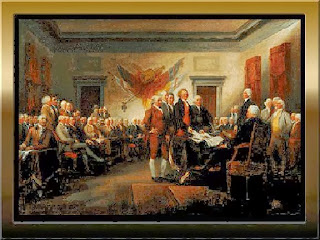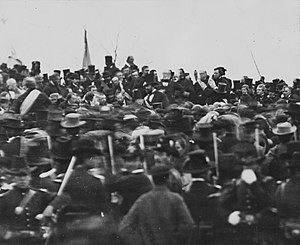 "It is the nature of power, especially political power, but all power... the nature of power is to centralize and then to expand." -- Oliver DeMille
"It is the nature of power, especially political power, but all power... the nature of power is to centralize and then to expand." -- Oliver DeMille
This is a profound statement. But is it true? If so, did the founders know that? What safety measures did they put in place to protect our freedom? And how have those safeties been violated since their implementation?
Any glimpse at history would show that power, if left unchecked, will always seek more power. The founders recognized this. So they took proper precautionary advances to stop this. As Jefferson said that "It is by dividing and subdividing these republics...that all will be done for the best." (Letter to Joseph C. Cabell, 1816)
What are these "divisions and subdivisions" that the founders placed into our Constitution to protect us?
There are 16 major principles that lay the foundation of our country's freedom from this "over-centralized" government. Let's take a moment to go over these 16 foundations of a free republic.
16 Divisions and Subdivisions of Government
The founders wrote these things into our supreme law. As we take a look at these principles please look for ways that these things may have been violated.
- A separation of powers between the branches of government.
- Checks (as in checks & balances). The founders referred to these as negatives, or ways that one branch can stop the others.
- Balances. Referred to as positives by the founders. It is a way to force cooperation between branches.
- A separation of powers between the federal and state governments by using checks and balances.
- 20 powers of the congress written into the Constitution.
- All powers of government were specifically written out and prescribed. All unwritten rights rest with the people and the states.
- A jury of the vicinage, or a jury of those who know you so that your rights may be properly protected. This form of jury actually had the power to negate any law in a given case if they so desired.
- Tax collection was a state power. No "income tax" or federal taxation of people specifically.
- States could veto federal programs by using their appointed senators.
- There were limits on government coining and spending money.
- A bill of rights and due process, habius corpus.
- State oversight of wars and treaties via appointed Senators.
- No ex post facto laws or retroactive laws.
- No bills of attainder or a bill that targets a specific group or person.
- That the Legislature has primacy. Because it is represented by the people it should have more power and more checks.
- Privacy rights and protection of personal papers and forms.
These were what the founders did to stop our Government from centralizing and expanding. But were there ways around this? If these divisions represent the rope that is holding up our Constitution, have we violated them to the point that it is "hanging as it is, by a single thread"?
 Waves of Attack: Cutting the threads
Waves of Attack: Cutting the threads
In the history of our country there have been four waves of attack on our Constitution, and each one significantly damaged our rope. While at the time it didn't seem like a huge deal, after all the attacks it's starting to pile up. And now the government of "We the People" is hanging by a thread. Let's take a look at these waves.
The First Wave: 1803-1824
In 1803 the first major blow to our rope came. In the case of Marbury v. Madison the Judiciary branch ruled that it had the power to determine the constitutionality of anything for anyone in the government. This came from the idea that they could do this "in any given case." They did not have that power and they gave to themselves what they did not posses in the first place, sound like a centralization of power? I would say so.
Later, in the case of Cohens v. Virginia in 1821 the Supreme Court ruled itself above the states with its power to veto the states' decisions. Once again the court attacked our foundation and centralized the government power even more.
Over the following years even more cases were tried, and the power was shifted further to the Supreme Court.
In this attack there were major blows to divisions 1-3, and a large loss of division 4. Though it was not huge, we started down a path a centralization that has not stopped.
The Second Wave: Post-Civil War carpet bagging.
Following the civil war there was a huge push for bigger federal government and smaller state government. This was only the natural response to a civil conflict. But, in result of this change, there were some decisions made and national attitudes changed that still affect us almost 200 years later.
1. The first big attitude change was huge. The government began to act as more of a national government instead of a federal government. This was big. Where a federal government is there to keep the states working together in a national federation, a national government was one where the basic unit was the nation, and the states are only divisions of it. In this new focus and attitude the states surrendered many of their rights to the now national government. At this point the emphasis moved from The United States of America, to, The United States of America.
2. The next paradigm shift came as a serious blow to divisions 5 and 6. The national idea of where unwritten rights lay changed drastically. This had happened before at the time of the Norman conquest of England. Before the Norman invasion, the Anglo-Saxons had some government. It even worked! The basis of this government was that it would take care of the rights and executions of laws that were prescribed to it by their law. Any unwritten, God given rights lay with people until the people willingly gave them to the government. This was the view of pre-civil war America. Following the war, there was a shift to the Norman approach to government. This basically consisted of a supreme government that held all rights and power in itself. This idea was the new framework for post-civil war America.
3. The last attack of this wave was very direct, focusing on one division. This was the jury of the vicinage. In this attack the judicial branch ruled that juries no longer had power to negate laws. Even though this seems slightly insignificant, in the actuality of the matter, this was a huge shift in power to the national government. Once again we see the power centralizing.
At this point we are seeing a significant number of our threads have been weakened and several have been formally cut.
The Third Wave: 1913
1913 was a horrendous year for America. Interesting that this happened 100 years ago. If the fourth turning (see The Fourth Turning, Strauss & Howe) holds true, we may be in for a huge fatal attack in the upcoming years, but more on that later.
Three major things struck our divisions in 1913.
1. The Sixteenth Amendment.
"The Congress shall have power to lay and collect taxes on incomes, from whatever source derived, without apportionment among the several States, and without regard to any census or enumeration."
This amendment shifted the power to tax people from the states to the Congress. It also places an income tax on the people. At this point the states still had some power, but the national government had far more than the states did. At this point the only real ability and hold that the states had against the government is their appointed senators. But that is about to change.
2. The next attack of 1913 came with the Seventeenth Amendment. Let's take a look at that one:
"The Senate of the United States shall be composed of two Senators from each State, elected by the people thereof, for six years; and each Senator shall have one vote..."
This is bad. This amendment utterly abolished the 4th, 9th, and 12th divisions. By doing this, the states no longer had any real say over what happened in the Congress. This was one of the worst things ever done to our Constitution. It also laid the path for further centralization of power.
3. The last attack of 1913 came with the establishment of the Federal Reserve. Contrary to popular belief, the Federal Reserve is not a government organization! It is, however, a private business that makes money making money. Oh, and they're the only people that can do this. That means it's a money making monopoly. Not cool. This attacked division ten very directly. Now there was no limit to "coining money" and with a government that already spent more than it earned we were in for some trouble.
Where are we now?
Let's take a moment and look at the world of 1913. At this point was the Constitution hanging by a thread? Let's look at our list again:
1st-4th : infringed on by 1st and 2nd waves.
5th-7th : attacked by 2nd wave
8th-10th, 12th: Destroyed by 3rd wave.
So, of the original 16, we only have five real divisions left, I believe that would constitute hanging by a thread.
 The Fourth Wave: Black Tuesday to ???
The Fourth Wave: Black Tuesday to ???
The fourth attack started with Black Tuesday, later with the 9/11 attacks, and in the 2008 market free fall. In lieu of this, we have seen a huge campaign for bigger national government and smaller state governments. This plan ran smoothly through the system because of the change in the senate. Many other divisions were violated at this time as well. Ex post facto laws were being passed left and right, justified by a government trying to save these businesses that were, "Too Big to Fail." Many of these bills also targeted small groups or individuals. In a short period of time two of the remaining divisions were completely forgotten.
Also there was the Patriot Act. With that went a part of the Bill of Rights and due process is only a formality. Because of all this the government has completely bypassed almost all of it's divisions. Most of the power has now centralized in Washington, and we have seen it expanding quickly. Obama has already issued 14 executive orders (which bypasses division 15) and with the NSA, Homeland Security, and all the other "Big Brother" programs we have lost the 16th division.
This is where we stand now. The first three divisions are the only ones that are even partially left. We are on the brink of a loss of our freedoms. We are in desperate need of people, statesmen, who can restore our freedom. Who can bring back what has been lost. Are we ready, or will we stand idly by as we lose the last freedoms we have?
What can we do about it?
This has been a rather depressing topic. If you have been discouraged by this, don't be! There's still a hope for America. I'm sure that there is a solution, but to find it, we need to look at the source of the problem.
I believe that the problem lies in complacency. There were three points about complacency that Oliver DeMille lines out in his audio course
Hanging By a Thread (which, by the way, is the inspiration for this article). Let's look at these points.
- The people don't know that these things are happening.
- The masses don't read the classics.
- We've lost leadership qualities and innovative qualities as a society.
These are the problems, so how can we fix them? There are things we can do to save this country! Here are some ways that you can fight the complacency.
- Share what is happening in our world. (you could share this article, start right now!) Increase awareness on major world issues.
- Read! Help promote this point others, that those who know the classics will lead society.
- Be entrepreneurs. They have the qualities of leadership and Innovation that we need to fix our country.
This is what we need to do about it. Stand up, fight for your beliefs and for your freedom!
The nature of power is first, to centralize, and then to expand. Our government has centralized into Washington and now we are seeing it expanding. The divisions of the Constitution, the rope that holds it up, have been cut away over the many waves of attack. We are at the edge. If we sit here complacently and let the storm wash over us we will have to look our grandchildren in the eyes and tell them that we lost their freedom. We can fix this if we try. Even though our freedoms are hanging by a thread, we can save this. We can take that rope and we can fix it, and bring us back to the glory of ages past. Will you stand for liberty?
Thank you for you time. Have a great day!
Inspiration for this article, division list and quotes from Oliver DeMille's audio lecture; Hanging By a Thread available for purchase at link.
 The Declaration of Independence was a powerful call to action. It nobly declared that the British government was corrupt, and that government should be in the governed. But why did this matter? Because ALL men are created EQUAL and have certain UNALIENABLE RIGHTS. Jefferson said, " to secure these ends (the protection of our unalienable rights), governments are instituted among men, deriving their just powers from the consent of the governed". We learn from Jefferson's words that governments exist with the sole purpose of protecting our unalienable rights. These rights, outlined in the declaration, are life, liberty, and the pursuit of happiness which is made manifest in one's property. These four rights, life, liberty, pursuit of happiness, and the pursuit of property were the things that those men pledged their all to defend. This is amazing to us today. How could they risk everything for that? Why is this such a foreign idea to us today? Could it be because we are not willing to do the same?
The Declaration of Independence was a powerful call to action. It nobly declared that the British government was corrupt, and that government should be in the governed. But why did this matter? Because ALL men are created EQUAL and have certain UNALIENABLE RIGHTS. Jefferson said, " to secure these ends (the protection of our unalienable rights), governments are instituted among men, deriving their just powers from the consent of the governed". We learn from Jefferson's words that governments exist with the sole purpose of protecting our unalienable rights. These rights, outlined in the declaration, are life, liberty, and the pursuit of happiness which is made manifest in one's property. These four rights, life, liberty, pursuit of happiness, and the pursuit of property were the things that those men pledged their all to defend. This is amazing to us today. How could they risk everything for that? Why is this such a foreign idea to us today? Could it be because we are not willing to do the same?





